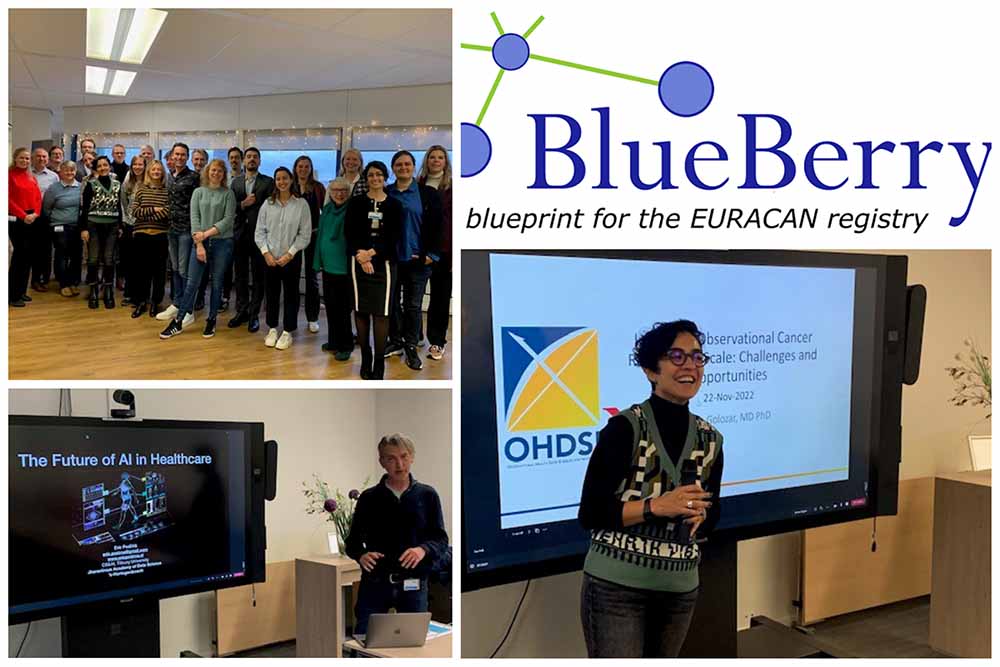
BlueBerry is now really taking off! Building a blueprint for the EURACAN rare cancer registry
The BlueBerry Kick Off meeting took place on the 22nd of November both in Utrecht and online. For the next two years European medical centers and organizations will work together to deliver a blueprint for a sustainable, scalable, and impactful EURACAN rare cancers registry. EURACAN is the European Reference Network for adult patients with rare solid cancers. To better understand and treat such rare cancers, European collaboration is essential. Therefore, the Dutch Cancer Society (KWF) funded BlueBerry in order to shape such a European rare cancer registry.
The meeting included talks from four guest speakers who gave a mix of inspirational talks and additional insights on the patient, clinical, and technological aspects of the project. Furthermore, representatives from each work package took the opportunity to present the status and goals of their work packages, and to invite input from the participants. The very multidisciplinary group offered many different and valuable perspectives!
Meet our four guest speakers
Asieh Golozar, global Head of Data Science at Odysseus Data Services and professor at the OHDSI Center, Northeastern University
In her presentation Impactful Observational Cancer Research at scale with a common data model Golozar explains the advantages of the use of the OHDSI approach to enable observational cancer study in a global network setting. Within the OHDSI community all participating data partners use standardized data, while analytics can be done on site, without data sharing. Using this common data model, the community performs observational cancer studies in a network setting. The common data model forms the foundation to answer series of questions in cancer like disease burden, characteristics of patients or treatment patterns. In BlueBerry, all participating centers will harmonize their data according to the OHDSI Common Data Model.
‘Building the future of observational cancer research together’ – Asieh Golozar, global Head of Data Science at Odysseus Data Services and professor at the OHDSI Center
Eric Postma, professor in Artificial Intelligence at the Tilburg University and at the Jheronimus Academy of Data Science in Den Bosch
Postma discussed a broad overview of AI in different settings and zoomed into the potential for healthcare in general and rare disease in particular. He is very optimistic about the use of artificial intelligence (AI) in healthcare in the future. The breakthrough in AI is deep learning; deep learning can be applied to sparse-data problems in health care, like data of rare cancers. Transfer learning may work for rare cancers, starting from cancers which have many similarities. AI algorithms are powerful tools that can exceed the human pattern-recognition capabilities, but require guidance by human domain experts that are aware of the strengths and limitations of AI. The challenge is to find a proper balance between de best of both worlds: narrow AI and human expertise.
I'm not interested in creating humans with AI. We are already good at making humans. We don't need computers for that. But I am interested in having humans meaningfully work together with powerful and stupid pattern recognition systems (also known as AI) - Eric Postma, professor in AI at the Tilburg University and at the Jheronimus Academy of Data Science in Den Bosch
Judith Taylor, ePAG EURACAN, trustee and chair Tyroid Trust UK, co-director and secretary of the Thyroid Cancer Alliance (TCA)
Taylor holds a speech about (patient) registries as a global priority in the field of rare diseases. In order to foster the development of registries and adoption by patients we need to ensure to have a proper informed consent process. By involving patients in the BlueBerry project, we might expect concerns of patients:
- How might the registry benefit me and/or future patients.
- What kind of data will be collected.
- How safe is my data; who can access my data and can the data be linked to me.
There is a real need to improve prevention, early detection, treatment and Quality of Live of patients with rare cancers by improving data exchange and interoperability - Mai Tran, project coordinator lnfrastructure Dutch Cancer Society (KWF)
Dirk Grünhagen, surgical Oncologist Erasmus MC, with special interest in Sarcoma, Melanoma and Colorectal Liver Metastases
Grünhagen emphasizes the urge of collaboration in networks and registry in the field of sarcoma. We need data for care, auditing and research. The sarcoma incidence in the Netherlands is about 700 adults per year; which is 1% of all malignancies. There are 7 Dutch sarcoma expert centers in which 45% of the sarcoma is diagnosed and treated. What is needed for collaboration in network: good diagnostics requires uniform quality to recognize early warnings of rare cancers. Treatment must be given in expert centers by experts teams; sometimes the treatment can be executed in referring centers. This has implications on how we collect data in and around the reference centers in Europe. Data should be collected for care, auditing as well as research.
Clinical expertise and enthusiasm are clearly not the bottlenecks: We need a registry now, not tomorrow! – Annalisa Trama, Director Fondazione IRCCS instituto Nazionale dei Tumori (INT), Milano
Work packages
BlueBerry has four work packages to manage:
More information
The BlueBerry project has started in the second half of 2022. The project will end in 2024. For more information about BlueBerry, contact Eva Polk, project manager BlueBerry.
Read our former BlueBerry article 'Upscaling and expanding the European rare adult solid cancer registry'